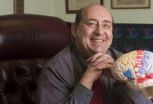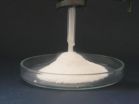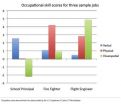(Press-News.org) Children conceived by in vitro fertilization (IVF) perform at least as well as their peers on academic tests at all ages from grade 3 to 12, according to a new University of Iowa study.
In fact, the study, published in the October issue of the journal Human Reproduction, found that children who were conceived by IVF actually scored better than age- and gender-matched peers on the Iowa Test of Basic Skills and the Iowa Test for Educational Development (ITBS/ED).
"Our findings are reassuring for clinicians and patients as they suggest that being conceived through IVF does not have any detrimental effects on a child's intelligence or cognitive development," said lead study author Bradley Van Voorhis, M.D., UI professor of obstetrics and gynecology and director of the Center for Advanced Reproductive Care at UI Hospitals and Clinics.
To investigate whether being conceived by IVF had long-term negative effects on children's cognitive development, Van Voorhis and colleagues compared the academic performance of 423 Iowa children, ages 8 to 17, who were conceived by IVF at UI Hospitals and Clinics with the performance of 372 age- and gender-matched peers from the same Iowa schools. The researchers also analyzed whether different characteristics of the children, parents or IVF methods affected children's test scores.
The study found that children born by IVF performed above average on standardized tests compared to their peers, and that a number of factors were linked to higher test scores, including older age of the mother, higher education levels of both parents and lower levels of divorce.
Importantly, the study also showed that different IVF procedures -- using fresh versus frozen embryos -- and different methods of insemination had no effect on children's test scores.
Although the study was not able to fully explain why children conceived by IVF performed better than their peers, Van Voorhis speculated that parents of children conceive by IVF might be older and have higher levels of education than average.
"By using age- and gender-matched children from the same classrooms as a control group to compare to our study participants, we attempted to control for any socioeconomic or environmental differences between the children born by IVF and their peers," Van Voorhis said. "But there still may have been some differences between the IVF children and the controls that we could not see from our data."
Among children born by IVF, the researchers did find a potentially concerning trend toward worse test scores for multiple births -- single babies performed better than twins, who performed better than triplets. However, this trend was not statistically significant and the triplets still did better that the average score of non-IVF children.
"This trend fits with our thinking that singleton births are healthier than multiple births, but we would need further study to find out if this trend is a real effect," Van Voorhis said.
IVF is generally considered safe but the technology has only been used for about 30 years, so there is a lack of data on long-term health outcomes for children conceived this way.
The UI study is the largest to date and followed children to an older age than previous studies. Additional strengths of the study included having a suitable control group and using the ITBS/ED, which is a widely accepted, objective measure of educational outcomes.
INFORMATION:
In addition to Van Voorhis, the UI team included Lindsay Mains, M.D., M. Bridget Zimmerman, Ph.D., Jill Blaine, Barbara Stegmann, M.D., Amy Sparks, Ph.D., and Timothy Ansley, Ph.D.
STORY SOURCE: University of Iowa Health Care Media Relations, 200 Hawkins Drive, Room W319 GH, Iowa City, Iowa 52242-1009
MEDIA CONTACT: Jennifer Brown, 319-356-7124, jennifer-l-brown@uiowa.edu
END
What if there was a drug that could completely eliminate airborne disease transmission that occurs when someone coughs? Researchers at the University of Alberta believe they have found a way to achieve this.
The idea behind this work came from Malcolm King and his research associate Gustavo Zayas, who work in the Division of Pulmonary Medicine at the U of A's Faculty of Medicine & Dentistry. King and Zayas developed a drug that, when inhaled, would reduce or eliminate the amount of droplets, called bioaerosol, coming out of the mouth when a disease-infected person coughs. ...
Scientists are reporting the development and successful initial testing of a new form of methotrexate — the mainstay anticancer drug — designed to be given as nose drops rather than injected. It shows promise as a more effective treatment for brain cancer, they say. The report appears in ACS' Molecular Pharmaceutics, a bi-monthly journal.
Tomotaka Shingaki and colleagues note that brain cancer is difficult to treat, partly because current anticancer drugs have difficulty reaching the brain. That's because the so-called blood-brain barrier (a protective layer of cells ...
We've all heard the saying about people who can't walk and chew gum at the same time, but it turns out that walking and talking is difficult enough, especially for people with Parkinson's disease who are at increased risk for falls with injury.
A new Florida State University study found that older adults with Parkinson's disease altered their gait — stride length, step velocity and the time they spent stabilizing on two feet — when asked to perform increasingly difficult verbal tasks while walking. But the real surprise was that even older adults without a neurological ...
The antibacterial ingredient in some soaps, toothpastes, odor-fighting socks, and even computer keyboards is pointing scientists toward a long-sought new treatment for a parasitic disease that affects almost two billion people. Their report on how triclosan became the guiding light for future development of drugs for toxoplasmosis appears in ACS' monthly Journal of Medicinal Chemistry.
In the study, Rima McLeod and colleagues point out that toxoplasmosis is one of the world's most common parasitic infections, affecting about one-third of the world population, including ...
Researchers from the Cardiac & Vascular Institute at NYU Langone Medical Center will present at the Transcatheter Cardiovascular Therapeutics (TCT) 2010 scientific symposium on September 21-25, 2010 in Washington, DC. They will be available for interviews during the conference.
Louis Miller, MD
Interventional Cardiology Fellow, Department of Medicine, Leon H. Charney Division of Cardiology at NYU Langone Medical Center
Wednesday, September 22, 2010
Presenter
•Very Long-term Clinical Follow-up After Fractional Flow Reserve-Guided Coronary Revascularization, ...
An unusual substance known as "dry water," which resembles powdered sugar, could provide a new way to absorb and store carbon dioxide, the major greenhouse gas that contributes to global warming, scientists reported at the 240th National Meeting of the American Chemical Society. The powder shows bright promise for a number of other uses, they said. It may, for instance, be a greener, more energy-efficient way of jump-starting the chemical reactions used to make hundreds of consumer products. Dry water also could provide a safer way to store and transport potentially harmful ...
COLUMBIA, Mo. – Although obesity is a major risk factor for disease, much of the threat may be associated with the metabolic (or cardiometabolic) syndrome, a cluster of risk factors related to diabetes and heart disease. Losing weight can improve health and reduce many of these risk factors. However, many people struggle to keep the weight off long-term. Now, researchers at the University of Missouri have found that people who perform resistance training while regaining weight can help maintain strides in reducing their risks for chronic disease.
"Long-term weight loss ...
Imagine devices that capture electricity from the air — much like solar cells capture sunlight — and using them to light a house or recharge an electric car. Imagine using similar panels on the rooftops of buildings to prevent lightning before it forms. Strange as it may sound, scientists already are in the early stages of developing such devices, according to a report at the 240th National Meeting of the American Chemical Society.
"Our research could pave the way for turning electricity from the atmosphere into an alternative energy source for the future," said study ...
Portable devices that use a laser beam to probe bones, teeth, and other parts of the body for early signs of diseases like osteoporosis and tooth decay may seem like something out of science fiction. But those devices are moving closer to reality, according to an article in the current issue of Chemical & Engineering News (C&EN), ACS' weekly newsmagazine.
C&EN Senior Editor Celia Henry Arnaud notes that these new diagnostic tools will have the ability to see beneath the skin and detect disease, without exposing patients to X-rays. They embrace a technology that involves ...
Toronto, Canada – In an international study of patients with a devastating type of dementia that often strikes in middle age, researchers have found intriguing evidence that career choice may influence where the disease takes root in the brain.
The study was led by Baycrest's Rotman Research Institute in collaboration with the Memory and Aging Centre at the University of California, San Francisco and several U.S. and European clinical sites. It appears online today in the Article in Press section of the journal Neuropsychologia, ahead of publication.
Researchers ...


